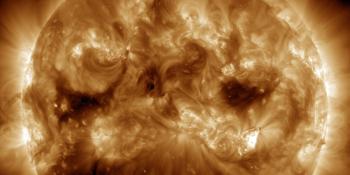Viewing archive of Thursday, 28 April 2011
Solar activity report
Any mentioned solar flare in this report has a scaling factor applied by the Space Weather Prediction Center (SWPC). Because of the SWPC scaling factor, solar flares are reported as 42% smaller than for the science quality data. The scaling factor has been removed from our archived solar flare data to reflect the true physical units.
Report of Solar-Geophysical Activity 2011 Apr 28 2200 UTCPrepared by the NOAA © SWPC and processed by SpaceWeatherLive.com
Joint USAF/NOAA Report of Solar and Geophysical Activity
SDF Number 118 Issued at 2200Z on 28 Apr 2011IA. Analysis of Solar Active Regions and Activity from 27-2100Z to 28-2100Z
Solar activity has been at low levels for the past 24
hours. Several C-class events were observed throughout the period,
the largest being a C2 flare at 28/1203Z from Region 1199 (N18W48).
Region 1196 (S23W32) regained sunspots and also produced a lower
level C-class event. Regions 1202 (N15W38) and 1203 (N19E77) were
numbered today. Region 1202 emerged as a simple beta group, while
Region 1203 rotated onto the east limb as an alpha group.
IB. Solar Activity Forecast
Solar activity is expected to be at
low levels for the next three days (29 April - 01 May). There also
remains a slight chance for M-class events with Region 1203 rotating
onto the disk and Region 1195 and 1199 continuing to grow and
evolve.
IIA. Geophysical Activity Summary 27-2100Z to 28-2100Z
The geomagnetic field has been at quiet levels for the past 24 hours.
Measurements by the ACE spacecraft show a solar sector boundary
crossing occurred at 28/1445Z. Solar wind speed increased from
around 320 - 360 km/s, behind a 12 hour bump in density. The Phi
angle also rotated from a positive influence to a negative.
IIB. Geophysical Activity Forecast
The geomagnetic field is
expected to remain at mostly quiet levels for day 1 (29 April) of
the forecast period. On days 2 and 3 (30 April - 01 May), unsettled
to active levels with isolated periods of minor storming are
expected, due to the arrival of a coronal hole high-speed stream.
III. Event Probabilities 29 Apr to 01 May
| Class M | 05% | 05% | 05% |
| Class X | 01% | 01% | 01% |
| Proton | 01% | 01% | 01% |
| PCAF | green | ||
IV. Penticton 10.7 cm Flux
Observed 28 Apr 110 Predicted 29 Apr-01 May 110/110/105 90 Day Mean 28 Apr 107
V. Geomagnetic A Indices
Observed Afr/Ap 27 Apr 000/003 Estimated Afr/Ap 28 Apr 001/003 Predicted Afr/Ap 29 Apr-01 May 005/005-010/010-012/012
VI. Geomagnetic Activity Probabilities 29 Apr to 01 May
| A. Middle Latitudes | |||
|---|---|---|---|
| Active | 10% | 35% | 40% |
| Minor storm | 01% | 05% | 10% |
| Major-severe storm | 01% | 01% | 01% |
| B. High Latitudes | |||
|---|---|---|---|
| Active | 10% | 35% | 40% |
| Minor storm | 01% | 05% | 15% |
| Major-severe storm | 01% | 01% | 01% |
All times in UTC
Latest news
Latest forum messages
AR4046 98Aurora photography hints for those of us with smartphones 48Large Coronal Hole 25 178Incoming & Unnumbered Active Regions 1655LASCO Data Not Updating 5
More topicsSupport SpaceWeatherLive.com!
A lot of people come to SpaceWeatherLive to follow the Sun's activity or if there is aurora to be seen, but with more traffic comes higher server costs. Consider a donation if you enjoy SpaceWeatherLive so we can keep the website online!

Space weather facts
| Last X-flare | 2025/03/28 | X1.1 |
| Last M-flare | 2025/03/28 | M1.7 |
| Last geomagnetic storm | 2025/03/27 | Kp5 (G1) |
| Spotless days | |
|---|---|
| Last spotless day | 2022/06/08 |
| Monthly mean Sunspot Number | |
|---|---|
| February 2025 | 154.6 +17.6 |
| March 2025 | 130 -24.6 |
| Last 30 days | 130 -21.9 |


